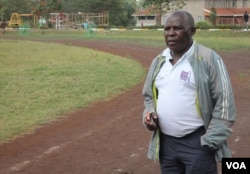A month ago, the Kenyan athletics community was rocked by the news that the female winner of the Boston and Chicago marathons had tested positive for an illegal substance.
A recent report found that doping was becoming a serious issue in the country, and now some Kenyan runners are afraid the scandal could cast a shadow over their reputation as the fastest long-distance runners in the world.
When Rita Jeptoo crossed the Chicago Marathon finish line in October - winning the race for the second time - the spectators were not the only ones cheering. Jeptoo’s fellow Kenyan runners thought they had chalked up yet another in an impressive string of athletic victories.
Jeptoo had also won the Boston Marathon three times, and two more Kenyan runners finished first in the New York marathon in early November.
Tested positive for EPO
But the euphoria was short-lived.
In late October it was reported that Jeptoo had tested positive for EPO, the same performance-enhancing drug American cyclist Lance Armstrong admitted to using.
Jeptoo is the highest-profile Kenyan athlete to test positive for a banned substance.
Jeptoo denied having taken EPO. And Athletics Kenya, the sport’s governing body, said that her test results are not yet definitive.
But the scandal has already sent shockwaves through Kenya’s athletics community.
John Mwithiga has trained Kenyan athletes for 25 years, including a number of national record-holders. He said doping has become a problem only recently.
“In the '80s, we did not have doping in Kenya. In the 90s, we did not have doping in Kenya. Now we are hearing of doping cases since the year 2000,” Mwithiga said.
Jeptoo is not the first Kenyan to be accused of doping, and Mwithiga said that even before the recent scandal, Kenya’s reputation for clean runners had begun to slip.
“I was in Poland about two years ago, during the World Cross Country [Championships], and I heard that people from Malaysia and other places saying that ‘now we are competing against the dopers,’ ” Mwithiga said.
Such accusations bother Mwithiga, who insists that his athletes’ performances are due to hard training and natural talent. Foreign managers, he said, are to blame for the influx of drugs.
Moni Wekesa, a professor of sports law and medicine at Mount Kenya University in Nairobi, said he agrees, for the most part.
“For a long time, Kenya has had this image of having natural runners since the days of the Rome Olympics in 1960, and so on. In terms of long-distance running, the depth of talent is just unimaginable. And most of these are actually exerting their natural talent," Wekesa said.
Anti-doping task force
But earlier this year, Wekesa chaired an anti-doping task force whose report, presented last month, found widespread problems.
Kenya has virtually no controls in place to prevent doping, the report said, adding that drugs were readily available and most athletes do not have enough information to make the right choices.
“The problem is very bad in the sense that there’s a lot of ignorance around the matter, and the sports federations are doing nothing and have done nothing about it before," Wekesa said. "There’s no doping education going on. Many budding athletes have no idea what drugs to take and for what to take them.”
Painting all Kenyan athletes as dopers would be unfair, he said, especially since banned substances are still more common in the West.
But a closer examination of Kenyans’ performances could ultimately be very good for the country, Wekesa added.
“This perception would be coming at the right time for Kenya because for a long time Kenya believed, ‘Well, we run naturally, we do our sport naturally, doping is a problem of elsewhere.’ But now with this kind of publicity, I think it’s high time that the authorities concerned sat down and did something about this," he said.
In early November, shortly after Jeptoo was accused of doping, Kenyan sports minister Hassan Wario Arero admitted the country had a doping problem. Wario also announced plans to open an anti-doping agency in the country by the end of the year.





